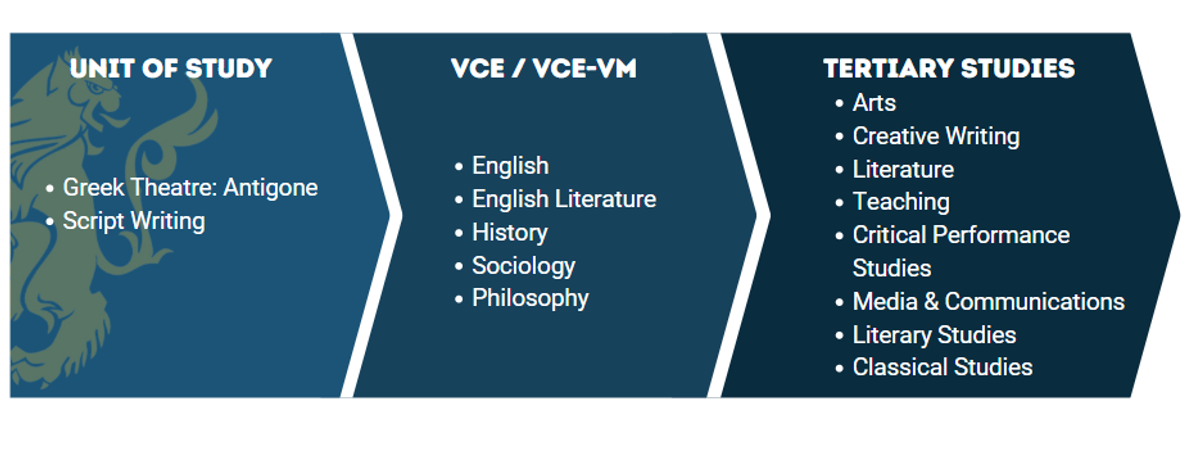English - Script Writing

Unit of Study: Script Writing
Brief Description: This unit introduces students to the fundamentals of scriptwriting with a focus on story-telling strategies for a global context. Scriptwriting elements covered include structure, plot, turning points, character, dialogue, scenes, setting, and subtext. Students will learn how these elements may be used to maximum creative advantage within divergent scriptwriting forms. Screen, stage, sound, gaming, and hybrid performance environments make different demands on the writer’s craft. The unit’s focus on global story-telling strategies reflects the increasing significance of international co-productions and cross-cultural audiences to the careers of twenty-first century scriptwriters.
In Term 4, students will analyse the conventions of script writing and craft their own scripts for television, stage, film, podcasting, radio.
Scaffolding Learning
At the conclusion of this unit of study students will have:
An understanding of key knowledge
- Students will gain a developed understanding of what constitutes Greek Tragedy.
- Students will gain the ability to challenge ideas and concepts that arise in complex texts.
- Students will gain the ability/tools/language needed to explore the common elements found in Greek theatre (structure, language, sound and form).
- Students will analyse the structure and conventions of script writing.
- Students will experiment with writing for a target audience.
- Students will develop an understanding of the structure, language and stylistic choices that combine to form a script.
Attained these key skills
- Students will be able to analyse structure, language and ideas found in Greek Tragedy.
- Students will have experimented with writing and analysing figurative language.
- Students will plan and write analytical responses to ideas found in the text.
- Students will explore the notion of fate and freewill and challenge these social constructs.
- Students will plan and write a script.
- Students will adapt the language features, stage directions and sound effects to achieve stylistic effect.
Demonstrated the Victorian curriculum standards and capabilities
- Reading & Viewing
- Language for interaction: (VCELA457)
- Text structure and organisation: (VCELA458)
- Expressing and developing ideas: (VCELA459)
- Literature and context: (VCELT460)
- Responding to literature: (VCELT461), (VCELT461), (VCELT462)
- Examining literature: (VCELT463), (VCELT464), (VCELT465)
- Texts in context: (VCELY466)
- Interpreting, analysing, evaluating: (VCELY467), (VCELY469)
- Writing
- Text structure and organisation: (VCELA470), (VCELA471)
- Expressing and Developing Ideas: (VCELA473), (VCELA474)
- Creating literature: (VCELT476), (VCELT477), (VCELT478)
- Creating texts: (VCELY479), (VCELY480), (VCELY481)
- Speaking & Listening
- Interacting with others: (VCELY485), (VCELY486)
Assessment Tasks
Students will be required to complete the following assessment tasks:
- An analytical essay in response to a theme or ideas explored in ‘Antigone’
- The development of a script
- Director’s notes/edits and annotations
Additional learning opportunities
- Potential Incursion for performance and analysis
Resources
- Families will need to purchase ‘Antigone’ by Sophocles
- Workbook, pens and highlighters
- A sense of vengeance (as directed by the Gods)
Pathways
This unit of study could provide students with the following pathway.
